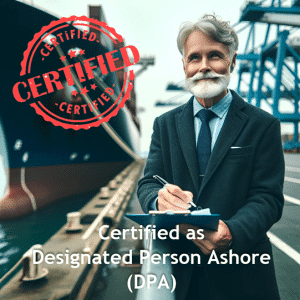The International Safety Management (ISM) Code is a crucial regulatory framework that aims to enhance the safety of ships and the protection of the environment. At the heart of the ISM Code’s implementation lies the Designated Person Ashore (DPA), a pivotal figure responsible for ensuring compliance and fostering a culture of safety within maritime organizations. In this article, we will explore the significance of the ISM Code, define the multifaceted role of the DPA, examine the challenges they face in compliance efforts, and outline best practices for effective DPA operations. By understanding these elements, maritime stakeholders can enhance their adherence to the ISM Code, ultimately contributing to safer and more efficient maritime operations.
Key Takeaways
- The ISM Code is essential for promoting safety and environmental protection in maritime operations.
- The Designated Person Ashore (DPA) plays a crucial role in ensuring compliance with the ISM Code.
- Key responsibilities of the DPA include monitoring safety practices and communicating with vessel management.
- DPAs often face challenges such as resistance to change and lack of sufficient resources.
- Implementing best practices can enhance the effectiveness of DPA operations within maritime organizations.
Understanding the ISM Code and its Importance
The International Safety Management (ISM) Code plays a crucial role in maritime safety by establishing comprehensive standards for the operation and management of ships and shipping companies. Adopted by the International Maritime Organization (IMO) in 1993, the ISM Code aims to enhance the safety of life at sea, protect the marine environment, and ensure the efficient operation of vessels. The importance of the ISM Code cannot be overstated; it provides a framework for risk management, safety assessment, and compliance with international regulations, fostering a culture of continuous improvement in maritime practices. By mandating ship owners and operators to develop and implement a Safety Management System (SMS), the ISM Code encourages proactive approaches to hazard identification and accident prevention. Furthermore, adherence to the ISM Code is essential for obtaining necessary certifications, enhancing a company’s reputation, and ensuring legal compliance, ultimately contributing to safer and more responsible maritime operations.
Defining the Role and Responsibilities of the Designated Person Ashore (DPA)
The role of the Designated Person Ashore (DPA) is critical in the maritime industry, particularly with regard to safety management and compliance with international maritime regulations. The DPA serves as the key link between the ship’s crew and the shore-based management, ensuring that safety protocols, environmental standards, and operational requirements are upheld. According to the International Maritime Organization (IMO), the DPA should possess adequate knowledge and competence to foster safety and environmental protection within the shipping operations. Responsibilities include overseeing the implementation of the Safety Management System (SMS), maintaining communication with the ship’s personnel, and managing emergency procedures. Furthermore, the DPA must ensure that adequate resources are allocated to manage risks effectively and provide ongoing training to staff, thereby promoting a culture of safety within the organization. By fulfilling these duties, the DPA plays an essential role in enhancing the overall efficiency of maritime operations while minimizing risks associated with maritime activities.
‘The best way to predict the future is to create it.’ – Peter Drucker
Challenges Faced by the DPA in Ensuring Compliance
The Critical Role of the Designated Person Ashore (DPA) in ISM Code Compliance is pivotal for maritime safety and operational efficiency. However, the DPA encounters several challenges that complicate their responsibilities in ensuring compliance with the International Safety Management (ISM) Code. One predominant challenge is the integration of safety management systems with existing operational practices aboard vessels. Many ship operators and crew members may show resistance to change, leading to difficulties in enforcing new safety protocols and practices. Moreover, keeping up with the evolving regulatory landscape presents another significant hurdle. The DPA must remain abreast of changes in maritime legislation and industry best practices, which necessitates continuous education and training. Additionally, communication barriers between the shore-based team and ship personnel can create misunderstandings regarding safety procedures, further affecting compliance. The DPA’s effectiveness is also contingent upon the organization’s commitment to fostering a culture of safety and compliance, which can be inconsistent across different maritime enterprises. Therefore, while the DPA plays a crucial role in enhancing ISM Code compliance, overcoming these challenges is imperative for improving maritime safety standards and ensuring that vessels operate within the prescribed legal frameworks.
Best Practices for Effective DPA Operations in Maritime Organizations
In maritime organizations, the adherence to the International Safety Management (ISM) Code is paramount for ensuring the safe operation of ships and the prevention of marine pollution. At the heart of this compliance lies the critical role of the Designated Person Ashore (DPA), whose responsibilities include facilitating communication between the ship and shore management, as well as ensuring that all safety policies are properly implemented onboard. Best practices for effective DPA operations involve a multi-faceted approach that emphasizes rigorous training, clear communication channels, and proactive risk management. First, the DPA should undergo comprehensive training in both maritime safety and management principles to fully understand the ISM Code’s requirements. This specialized training equips the DPA to identify potential safety issues before they escalate into serious incidents. Second, establishing open and continuous communication between the DPA and ship personnel fosters a culture of safety and transparency, making it easier to address concerns and implement corrective measures. Moreover, regular audits and evaluations should be instituted to monitor compliance with safety procedures and identify areas for improvement. By employing these best practices, maritime organizations can enhance the effectiveness of their DPA roles, thereby reinforcing ISM Code compliance and promoting safer maritime operations.
Virtual Maritime Academy is a leading provider of online maritime education and training, offering a wide range of courses designed to meet the needs of the global maritime industry. With a commitment to quality and innovation, Virtual Maritime Academy is dedicated to preparing seafarers and maritime professionals for success in their careers. Now a DNV Certified Maritime Training Provider, the academy upholds the highest standards of excellence in training and education.








